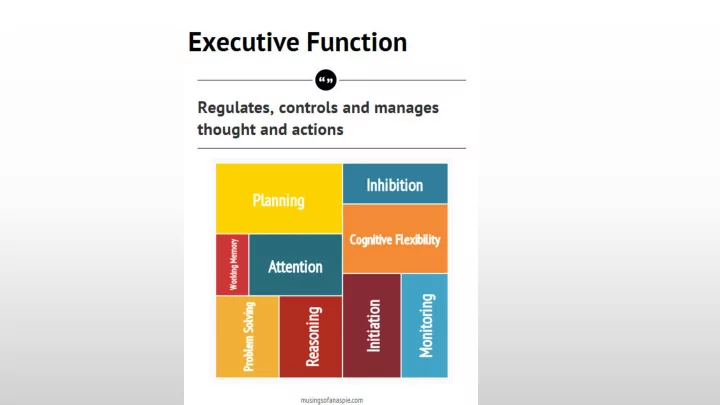

EF F Defi ficits Across Disabili1es • ADHD • Au&sm Spectrum Disorders • Toure3e Syndrome • Conduct Disorder • Turner’s Syndrome • Klinefelter Syndrome • Fragile X • Down’s Syndrome
Assessing Execu1ve Fu Func1oning Wisconsin Card Sort Tower of Hanoi
One mo more… Stroop Test Parent/Teacher Report • Behavior Ra&ng Inventory of Execu&ve Func&on (BRIEF)
Comp mponents of Execu1ve Fu Func1oning • Do not appear at the same level of mastery within an individual • Have different developmental trajectories occurring at different rates • Working memory, ini&a&on and organiza&on more impaired in ASD as they age • Manifest differently in dis&nct disorders • Inhibi&on less impaired in au&sm than ADHD • Planning more impaired in au&sm than ADHD • EF skills are more strongly associated with school readiness than IQ
Interven1ons for EF For typically developing and those with mild disabili&es, teaching strategies that enhance EF processes such as goal seSng, planning, organizing, priori&zing, shiTing strategies flexibly and self-checking improves student performance For those with more significant disabili&es, effec&ve methods to improve EF significantly are elusive Research has shown minimal gains and no long term effects.
Modifica1ons and Accommoda1ons • Changing, lowering or reducing learning expecta&ons is usually referred to as a modifica&on (alterna&ve assessment). • Accommoda&ons are intended to lessen the effects of a student's disability and level the playing field to demonstrate expecta&ons
Typical Accommoda1ons for EF Issues • Vary ac&vity oTen • Reduce/minimize distrac&ons • Extend/adjust &me • Allow frequent breaks • Provide checklists and visual schedules • Assis&ve technology • Taped text, highlighted materials, using calculators, computers, special equipment, communica&on devices • Assignments • Give direc&ons in small dis&nct steps, easier formats (matching), series of small assignments, give oral/visual cues or prompts, oral responses, adapt/simplify text for understanding. • Reinforcement • Concrete reinforcement, check for understanding (training trials)
Typical Modifica1ons for EF Issues • Use specialized curriculum wri3en at a lower level of understanding • Modify content areas by simplifying vocabulary, concepts, and principles • Adapt ac&vi&es with simplified vocabulary/concepts
Not a “Field of Dreams” or “One Size Fits All” • Student must be taught skills to use accommoda&ons and have many prac&ce opportuni&es prior to assessment • Accommoda&ons must be individualized to the needs of the child • What accommoda&ons does the child regularly use in the classroom? • What accommoda&ons has the child been willing to use?
Ques&ons?
Recommend
More recommend